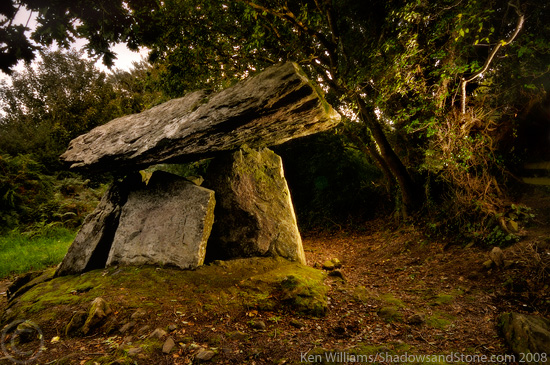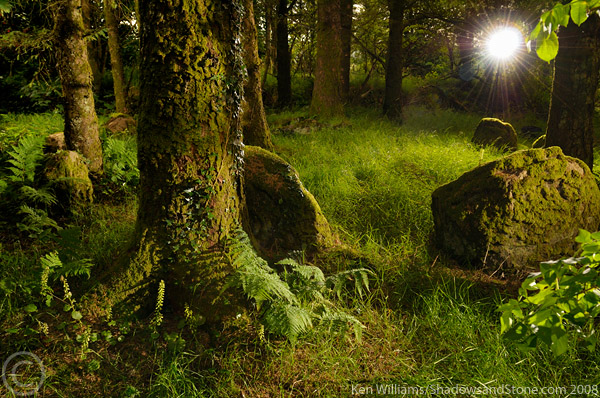
Carnbane West viewed from the hillside on Carnbane East, the cairns are obscured by mist. This might look photoshopped but the mist and golden light was magical enough as it was.

Carnbane West viewed from the hillside on Carnbane East, the cairns are obscured by mist. This might look photoshopped but the mist and golden light was magical enough as it was.

Misty hilltop, looking past one of the remaining kerbstones of Cairn I to Cairn L




Sunlight on the back stone of Cairn I shortly after sunrise

The more complex chamber facing south east.

The exposed chamber of Cairn I just after sunrise, looking slightly south-east with Carnbane East below the sun and Sliabh Rua and Cairn M to the right.

The rising sun burns through heavy morning mist, viewed through the portals of Cairn I 07/09/08, according to Martin Brennan this early September alignment warns of the approaching equinox.

Sunrise through the portals of Cairn I 07/09/08, according to Martin Brennan this early September alignment warns of the approaching equinox.

Looking from the rear of the right hand recess across the main chamber into the left hand recess. The passage enters from the left of this photo.

Back orthostat, left chamber

Decorated passage orthostats, left hand side

‘The Hags Chair’ with children
Taken after a talk for Heritage week on Sun. 31st August 2008. If anyone knows who these two kids are please contact me so I can forward a print to their parents.
Wednesdays in
Brú na Bóinne Visitor Centre
September 3rd 7.30pm
A Room with a View:
The Earlier Prehistoric Landscape of Brú na Bóinne
by Dr Conor Brady
Dundalk Institute of Technology
September 17th 7.30pm
Meath’s Landscape: what the Builders
of Loughcrew and Newgrange found.
By Dr Robert Meehan
Consultant Geologist
October 8th 8.00pm
Of Meat and Men:
Animals and Humans in Ancient Co Meath
By Dr Finbar McCormick
Queens University, Belfast
October 22nd 8.00pm
Newgrange Passage tomb and the Cursus:
There’s more to see than meets the eye
By Kevin Barton
Earthsound Associates
Free of Charge- All welcome!



On the way to the circle, if you look back over your shoulder as you reach the ridge, this is your view north towards the Iveragh Peninsula (the rock art of Derrynablaha sits somewhere in those hills in the distance).


An oldie from 2005





Hmmm, maybe if you stand three feet from your screen and squint, you should make our curving lines of a large sprial-esque motif. This is impossible to see with a naked guy.

A close up of that carving on the front of the basin in tomb B1

This is one amazing looking basin, the simple carving on its projecting front needs no further elaboration once you sit confronting this, for which my freudian subconcious suggested the name ‘The Devils Cauldron’.

The full carved surface, note the basins which are roughly pecked with no attempt to smooth them out.


Night time mist with the outcrops bearing rock art poking through

The sloping side has two close spaced cup and rings
This is possibly a new un-recorded or reported site, Avril Purcell described four panels in the townland, each on ‘unobtrusive’ flat, low lying boulders, these markings are in a large heavy boulder over 1.5m high and 2m broad. Two faces were found to have been carved, the top has weathered basins with rings and what look like cup and ring remains, the opposing face has two cup and rings very closely spaced.



A basin with lines joining two multiple rings with centre basins.

The owner of the house with this piece of rock art forming part of a wall asked that I did not give out the exact location of the stone as he doesn’t want visitors.
The stone was built into a shed or house that was being demolished, the farmer decided to save it and cemented it into his wall, right outside his front door. It’s unclear where exactly it was originally found. The whole panel is just over a foot high.

Now implanted in a wall surrounding a house.


Dromtine Rock Art.
This unusual panel has two basins with radial lines leading to pairs of multiple rings, some of which have basins in the centre. Other markings include cup and multiple rings with gutters and lines.
Expert lashes Bremore port location
“Speaking at a recent meeting of the Balbriggan Historical Society, Professor George Eogan said the area on both sides of the Delvin River from Gormanston to Bremore is a large Megalithic cemetery dating from 3,500BC.
He said this has been recorded, researched and written about for well over 100 years and added the mounds on this site are legally protected under the National Monuments Act of 1930.
The meeting was attended by a number of luminaries including former Green Party leader Trevor Sergeant and the Fingal County Manager.
Prof Eogan believes that Bremore may have been the first point of entry for the settlements of what is now known as Fingal/East Meath and the Boyne Valley area.
He has written a detailed report on the history of the area and the historical value of the site at Bremore.
Local historian Brendan Matthews has also expressed his concerns about the development of a new port on such a historical site and raised the issue as far back as 2005.
He said that in the immediate vicinity of the proposed deep-water port, there are the remains of at least five megalithic tombs or burial chambers, while to the north of Bremore there are the remains of at least another six tombs scattered over a wide area from Knocknagin to Lowther Lodge.
However, responding to the professor’s report and lecture, CEO of Drogheda Port, Paul Fleming said they recognise that there is archaeology at Bremore and will deal with it in an upfront and professional manner.
He said the archaeology of the site was just one element in what was a complicated and multi-faceted site selection process which took two years to complete.
Other factors included the importance of the deep water site, the road network and accessibility, the absence of any major residential activity, the availability of a landbank and the environmental impact in terms of its carbon footprint, he said.The archaeology is just one of the elements involved and we will deal with that in an upfront way. We have engaged our consultants who will carry out an environmental impact study (EIS) and they will be working with us over the next six to nine months, he said.We intend to deal with the archaeology in a world-class manner and we will, of course, take on board anything said by Professor Eogan.”
drogheda-independent.ie/news/expert-lashes-bremore-port-location-1400894.html


Carved orthostat on left side of chamber

Two carved orthostats from the right hand side of chamber.

Sunset viewed through the ‘roofbox’ of Cairn G

Distant view of Cairn B perched on top of its mountain ridge, viewed from the end of the local road.

Cairns H and G and a northerly view across the mountains of Sligo and Donegal. I think that is Benbulben in the far distance.


